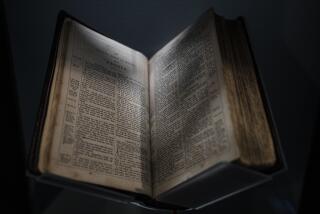The President in the Lion’s Den : Clinton forthrightly addresses religion in schools
- Share via
President Clinton’s statements Wednesday on religion were a necessary and welcome reiteration of the line that has existed and must continue to exist between church and state. His speech at a Virginia high school and a memo he released summarizing laws on religious expression in public schools are consistent with his longstanding interest in this issue and his concern about the state of morals, behavior and shared religious values in American life. They are also consistent with most Americans’ belief that religious faith and practices are an integral part of the national character and, at the same time, that in public schools these practices must remain voluntary and non-coercive.
Of course Clinton is responding to the political threat to his presidency posed by the religious right, from which come growing demands for a constitutional amendment allowing prayer in the schools. But it also is clear that the President’s effort to clarify what has become a muddle of court decisions and political distortions should be applauded by Americans of all--or no--religious affiliations.
Clinton reminded parents and school officials that the Constitution does not forbid religious expression in public schools. In making comments based on advice from the Department of Justice and the Department of Education, Clinton said that “the First Amendment permits--and protects--a greater degree of religious expression in public schools than many Americans may now understand.”
For example, he said he believes that the Constitution already allows students to read the Bible in study hall, to say grace in school cafeterias, wear T-shirts with religious slogans and images and conduct religious club meetings on school grounds.
“Most schools do a very good job of protecting students’ religious rights,” Clinton said. Schools have been wrong, he said, when on rare occasion they prevented students from exercising their religious beliefs in a voluntary, non-coercive way.
Because of the widespread confusion surrounding religious expression in the public schools, Clinton said, the White House will issue federal guidelines explaining what the law permits. This is a praiseworthy step. However, the President is also correct to remind Americans that “the right to engage in voluntary prayer or religious discussion . . . does not include the right to have a captive audience listen or to compel other students to participate.”
Clinton has performed a tremendous service for school officials, parents and teachers anxious to do the right thing in an area of extreme sensitivity. His comments should do much to reassure Americans of the value of their religious beliefs and to underscore the important place those values hold in daily life.
More to Read
Sign up for Essential California
The most important California stories and recommendations in your inbox every morning.
You may occasionally receive promotional content from the Los Angeles Times.












